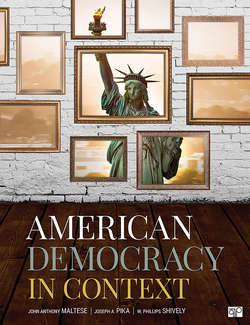Читать книгу American Democracy in Context - Joseph A. Pika - Страница 91
На сайте Литреса книга снята с продажи.
Consequences for Democracy
ОглавлениеDrawing on John Locke’s idea of the social contract, Americans embraced a written constitution to delineate the powers of government and the rights of its citizens. In contrast, Great Britain had an “unwritten” constitution that consisted of some written documents (such as the English Bill of Rights and Acts of Parliament) but also unwritten parliamentary conventions and royal prerogatives. Americans did not believe Britain’s more amorphous constitution had done enough to protect the rights of its citizens, in part because Parliament could alter the constitution through simple legislation. The fact that we have a written constitution embodying a republican form of government designed to protect individual liberty and to prevent concentrations of power in government is, in no small measure, a direct outgrowth of the history and influences discussed in this chapter.
Today, written constitutions (largely based on the U.S. example) are the norm. Unwritten constitutions, such as those in the United Kingdom, Israel, and New Zealand, are now the exception. Yet the success of our Constitution depends not only on the strength and flexibility of its own structure but also on the convergence of other less-definable factors, including timing and luck, coupled with an underlying commitment to the rule of law. This makes it more difficult to determine how, when, or even whether the success of the U.S. Constitution can be duplicated in other countries.
We tend to take the success of our system of government for granted and forget that its structure was not preordained. As we have seen, the framers of the Constitution had fundamentally different views on many issues. Many aspects of our government could have been different if competing arguments had won at the Constitutional Convention, state ratifying conventions, or any number of other points in our history.
For example, think of how things might have been different if the United States had not approved a written Constitution and embraced judicial review as a mechanism to enforce it. We could have survived—and probably survived quite well—without either of them (the United Kingdom has), but the consequences to you and our democratic system would have been quite profound. We will see in future chapters how much judicial review touches all of our lives. School desegregation, abortion rights, and free speech protections—to name just a few things shaped by judicial review—would have had to come from political action rather than the courts. That means that some of the rights you now expect might have been delayed or never even granted. But it also means that politicians would have had to confront some issues on which they now defer to courts. The result would have been a system worse in some ways and perhaps better in others, but the result would have had a direct impact on your life.
As a final cautionary note, it is worth remembering that at the end of the day, the words of the Constitution are not enough to guarantee either liberty or the rule of law. Those words must be enforced. Many governments—including dictatorial regimes—have had constitutions with lofty but often meaningless language protecting basic rights. Even in our own country, African Americans were denied fundamental rights, such as the ability to vote, long after the Thirteenth Amendment to the Constitution had abolished slavery, the Fourteenth Amendment guaranteed the equal protection of the laws, and the Fifteenth Amendment proclaimed that the right to vote would not be abridged because of race, color, or previous condition of servitude. As the great twentieth-century American judge Learned Hand once wrote: “Liberty lies in the hearts of men and women; when it dies there, no constitution, no law, no court can save it; no constitution, no law, no court can even do much to help it.”57
